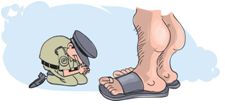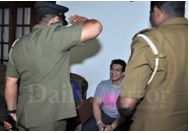SRI LANKA: On your knees ladies and gentlemen, on your knees!
Suggesting perhaps that the creative imagination of the cartoonist is catching up with the reality of Sri Lanka the Daily Mirror yesterday carried this cartoon as an illustration for its editorial entitled, A case for best legal brains.
 The cartoonist created this cartoon in reaction to a photograph which also appeared in the Daily Mirror in which a police officer saluted the controversial UPFA parliamentarian, Duminda Silva.
The cartoonist created this cartoon in reaction to a photograph which also appeared in the Daily Mirror in which a police officer saluted the controversial UPFA parliamentarian, Duminda Silva.
The cartoonist has extended his imagination from the particular to the general and thus described what every Sri Lankan knows as the  transformation that has taken place within the Sri Lankan policing service. To get down on their knees before every politician is now the obligation of every police officer of any rank. Gone are the days when they saluted only the national flag.
transformation that has taken place within the Sri Lankan policing service. To get down on their knees before every politician is now the obligation of every police officer of any rank. Gone are the days when they saluted only the national flag.
It is encouraging to see that the print media is now awakening and is coming to terms with the actual realities of the country. Of course this kind of ‘getting down on all fours’ is not something new. For several years now this transformation has been taking place but the local media was unable or unwilling to place it so graphically before the general public.
In Nepal when the royalty was still ruling there used to be a custom where the women had to drink the water that had been used for washing the king’s feet. No doubt today’s Sri Lankan police will even do that for the politicians who seem to appear to them as more important than even their gods.
Now that the real situation has been so graphically and authentically portrayed surely it will be the duty of the media to expose every aspect of this new servitude of the police to the ruling politicians. Whether the media would do this will depend very much on whether the media houses will refuse to go down on their knees in the same manner as the police officers.
What a creative cartoonist has done is to show the image of the police as any policemen would see it if they look in the mirror. The message that the cartoonist brings is not obvious to the police since a policing system that has gone so low is unlikely to learn any lessons, the message is, in fact, to the public and particularly those who still might retain a critical mind. What kind of protection can the people expect from such policemen? Of course what Bharatha Lakshman Premachandra and others victims of famous assassinations can expect is nothing more.
A more troubling question is as to whether the posture depicted in the cartoon demonstrates the police as a role model and that everybody in society should follow the example and go down on their knees before whoever claims to be a ruling party politician. Is the servitude of the police merely a manifestation of the servitude of the people as a whole?
We should salute a frank cartoonist who has spoken louder than the established media does these days. One way of showing some respect to such work is to keep this cartoon in front of every desk to remind ourselves of what the real Sri Lanka has become today.
(The cartoon and photograph are used courtesy of the Daily Mirror).



